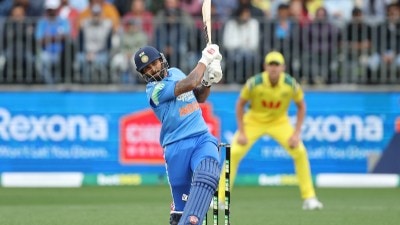Demagoguery apart
8216;The ceremony of innocence is drowned/ The best lack all conviction/ while the worst Are full of passionate intensity.

8216;The ceremony of innocence is drowned/ The best lack all conviction/ while the worst Are full of passionate intensity.8217;8212; WB Yeats
From the din of the Indian Parliament, several voices arose. Some made it to the headlines. Some didn8217;t matter. Some were eulogised as the hallelujah moments of Indian secularism. Amidst Lalu8217;s stinging banter, Mohammed Salim8217;s moral rhetoric, and Rahul Gandhi8217;s Kalawati, Omar Abdullah8217;s speech was hailed as the high point of the political debate, the 8220;stirring speech8221; that had the public and the media in raptures.
Contemporary political debate has been reduced to such a battle of wits where ideological strength seems only too conspicuous by its absence. More worryingly, one can only wonder at the political naiveteacute; of the gushing media who missed Omar8217;s political posturing completely.
Carpe diem 8212; that Latin phrase means 8216;seize the day8217;. Omar, like a sharp politician did just that. He seized his last national opportunity to reach out to his political constituency at the time when elections loom large and when the hangover of clashes over Amarnath ceases to abate. The short speech managed to press the right hot buttons 8212; Muslim identity, Gujarat riots and Amarnath shrine land transfer debacle. Bingo 8212; the speech was sharp and smart just like the much-focussed politics of Omar Abdullah and National Conference NC. Nothing noble or lofty about it, as some would have us believe.
Here are some deacute;jagrave; vu moments that one must recall:
August 27, 2006; The Times of India: 8220;My biggest regret is that I did not resign when V P Singh was the PM and he sent that team8217; In a stinging attack on Atal Bihari Vajpayee and L. K. Advani over the 1999 Kandahar hijack episode, former Jammu and Kashmir Chief Minister Farooq Abdullah accused the then Prime Minister and Home Minister of compelling him to release Jaish-e-Mohammad founder Maulana Masood Azhar for which the 8220;world will pay the price8221;. Abdullah, whose son Omar Abdullah was a minister during the NDA coalition8217;s rule: 8220;I told Advani I am going to the Governor. And I went to Raj Bhavan with my resignation,8221; the then Chief Minister said. He, however, did not resign.
Wanting to resign and not quite being able to do is an art the National Conference has mastered. On the Gujarat riots, Omar insisted he should have resigned and he almost did, but not quite. Be it the kidnapping of Rubaiya Sayeed , the Kandahar crisis, autonomy resolution for the state or the Gujarat riots, both Omar and his father have always managed to stop short of resigning! The pricking of their conscience in each case is almost always a tad late.
In 2000 as the J038;K Chief Minister , Abdullah Sr managed to prevail and get passed the resolution which recorded the approval of a report which demanded that autonomy be restored to its pre-1953 position 8212; when the Centre had jurisdiction over only three departments of defence, external affairs and communications. Endorsed by a two-thirds majority in the Assembly, Farooq words preceded his son8217;s. In his speech and interjections during the assembly debate, he strove to drive one point home: that he was an Indian, not a Pakistani.
A question that Farooq still hasn8217;t answered is why he chose to go to London in 1990 instead of staying on and fighting for autonomy during the years that the state was under President8217;s rule. Strangely, though he passed the autonomy report on the floor of the Assembly, he didn8217;t push it with the Centre with Omar as minister in the govt 8212; a fact that resurfaced with L.K. Advani8217;s biography My Country, My Life in which he said Farooq traded power for autonomy.
NC8217;s saga of flip flops spans decades and generations. NC did not pull out of the NDA after Gujarat, or even after the BJP refused to discuss 8216;autonomy8217;. However, after Farooq Abdullah was denied a place in the Union Cabinet was when his party reportedly began toying with the idea of pulling out of the NDA, which happened in July 2003 after a long power binge.
On the emotive Amarnath issue, Omar Abdullah asks 8212;8216;you show me one place where Kashmiris have attacked Amarnath Yatra pilgrims8217;? It must be pointed out to Omar that there have been several attacks on the pilgrims in last two decades. A simple search on the net will help him get his facts right.
It was Farooq Abdullah who established the Sri Amarnath Shrine Board in 2000. The pilgrimage was, until then, the charge of the Muslim family of Buta Malik which had discovered the cave in the 1850s and looked after it. 8220;This was a case of the government wantonly interfering with what was a worthy instance of spontaneous Hindu-Muslim harmony and cooperation8221;, says Praful Bidwai.
8216;We are not against the yatra but against the land transfer8221; is Omar8217;s clever stand. The yatra has been going on for hundreds of years and Omar need not take an undertaking to keep it going. His remark in Parliament sounds patronising 8212; almost a favour he and his Muslim brethren dole out to the 8216;Hindu others8217;. It8217;s a clever political posture aimed at reaching out to his constituency.
In the days of quicksilver equations, instant heroes and easy-fix solutions, let8217;s not blur the boundaries of spoken words and actions taken and let the smallness of politics engulf the larger purpose. Dalit woman, Muslim man 8212; our contemporary political debate is being reduced to a charade of nomenclature, the packaging more important than the product, the identity superseding the cause. Or do we in our lethargy, do away with sifting and sieving, and stick to slick sound bites alone to salvage our politics?
Shazia Ilmi anchors for Star News. The views expressed are personal
- 01
- 02
- 03
- 04
- 05































